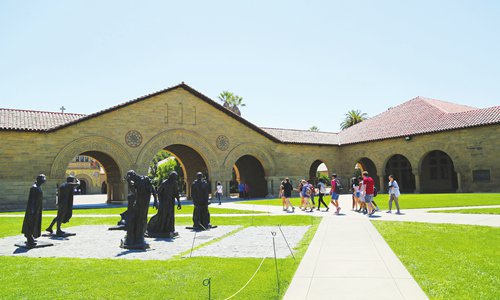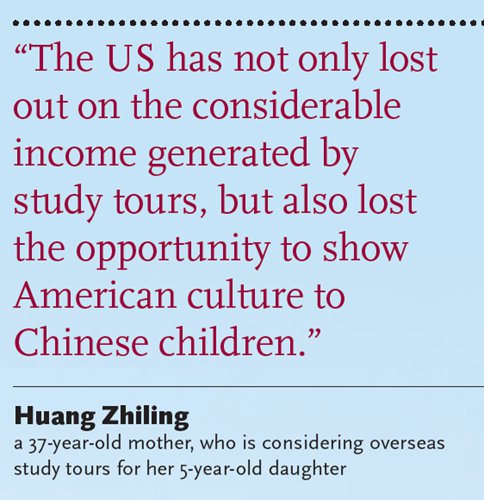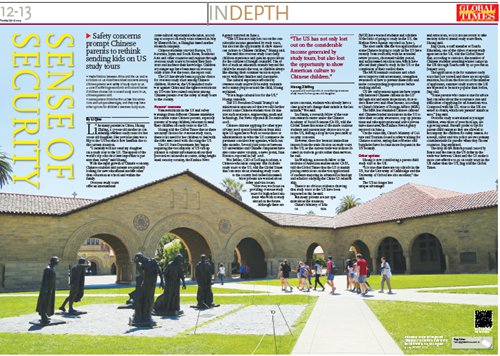HOME >> CHINA
Safety concerns prompt Chinese parents to rethink sending their kids on US study tours
By Li Qiao Source:Global Times Published: 2019/7/15 17:39:38
○ Trade frictions between China and the US and restrictions on US visas have raised concerns among Chinese parents over safety of study tours to US
○ US will suffer huge economic and cultural losses if children choose not to attend study tours in US, Chinese parents said
○ Some parents think that the US has lost its attraction and unique advantages, and that there are other options for children's overseas study tours

Like many parents in China, Huang Zhiling, a 37-year-old mother, is considering overseas study tours for her 5-year-old daughter. Her previous plan was a trip to the US but she is now hesitant due to the current situation.
"I certainly will not send my daughter on a study tour to the US. The appeal of the world's top schools is less important to parents than safety," said Huang.
With the rapid growth of China's economy, Chinese students and parents are gradually looking for new educational models other than education at school and within the family.
Overseas study tours offer an international cross-cultural experiential education, according to a report on study tours for Chinese students released in May by iResearch Inc, a Shanghai-based market research company.
Chinese students can visit Europe, US, Australia, Japan and South Korea, Southeast Asia and other countries and regions through overseas study tours to broaden their horizons and increase their knowledge. Children of younger age have been sent on overseas study tours over the years, the report said.
The US has always been a popular choice for overseas study tours among Chinese children. However, the US-launched trade war against China and the tighter restrictions on US visas have raised concerns among Chinese parents over the safety of study tours to the country.

Parents' concerns
Visa restrictions in the US and safety warnings from different Chinese ministries have made some Chinese parents, especially parents of young children, reluctant to send their children on study tours to the US.
Huang told the Global Times that as there are many choices for overseas study tours, there is no need for her children to deal with the risks associated with choosing the US.
The US State Department has begun requiring the vast majority of US visa applicants to submit information about their personal social media accounts, citing heightened security scrutiny, the Xinhua News Agency reported on June 2.
"The US has not only lost out on the considerable income generated by study tours, but also lost the opportunity to show American culture to Chinese children," Huang said.
She said that overseas study tours help children experience and gain an appreciation for the cultures of foreign countries. The effect of such an education extends beyond the child who attends the tour, as children always like sharing their summer vacation experiences with their families and classmates.
The cultural experience afforded by overseas study tours will be subtly transmitted to many people around the child, Huang explained.
"It is a huge cultural loss for the US," Huang contends.
The US President Donald Trump's administration announced that it would further restrict some Chinese student visas for majors such as science, engineering, math and technology, Fox News reported in December 2018.
Chinese citizens applying for other types of visas need special permission from multiple US agencies to work as researchers or administrators in what the US commerce department considers key agencies, which can take months. Several joint projects between US universities and Chinese companies have also come under scrutiny, Sina Finance, a news portal reported in July 2018.
Wei Jiebiao, CEO of Le Xing Academy, a Chinese education company that facilitates study tours to the US, told the Global Times that concerns about attending study tours to the country had indeed increased. Most parents are worried about safety and visa issues.
"However, we focus on providing overseas study tours for high school students who wish to study abroad in the future. Although there are more concerns, students who already have a clear goal won't change their minds at the last minute," Wei said.
Liu Simin, a research fellow of the tourism research center under the Chinese Academy of Social Sciences (CASS), told the Global Times that some of the more cautious students and parents may choose not to go to the US, fearing a drop in visa pass rates or security concerns.
However, there has been no immediate impact from the trade friction on study tours to the US, as the current trade war is more focused on trade in goods rather than services, he said.
Liu Weidong, a research fellow at the institute of American studies under CASS, told the Global Times that the US is mainly placing restrictions on the visa applications of students majoring in advanced technology and scholars studying the China-US relationship.
There is no obvious evidence showing that study tours to the US have been impacted so far, he said.
But many parents are not optimistic about the situation.
China's Ministry of Education (MOE) has warned students and scholars of the risks of going to study in the US, the Xinhua News Agency reported on June 3.
The alert states that the visa applications of some Chinese hoping to study in the US have recently been restricted, with an extended review process, shortened validity period, and an increased rejection rate, which have affected their plans to study in the US or the completion of their studies there.
The MOE reminds students and scholars to improve risk assessment, strengthen awareness of how to prevent these risks and make corresponding preparations before studying abroad.
US law enforcement agencies have repeatedly harassed Chinese citizens in the US through exit and entry inspections, door-to-door interviews and other means, according to China's Ministry of Foreign Affairs (MFA).
The MFA has reminded Chinese citizens and Chinese-funded institutions in the US to raise their security awareness, step up precautions and take appropriate and active preventative measures, the Xinhua News Agency reported on June 4.
On the same day, China's Ministry of Culture and Tourism issued a safety warning for Chinese tourists, saying that robberies and burglaries have become more frequent in the US recently.
Other options
Huang is now considering a parent-child study tour to the UK.
"It is true that there are top schools in the US, but the University of Cambridge and the University of Oxford are also excellent," she said.
The US no longer has unique advantages and attractions, so it is not necessary to take security risks to attend study tours there, Huang said.
Jing Quan, a staff member at Tianfu Education, one of the oldest overseas study agencies in the UK, told the Global Times that, according to statistics, the number of Chinese students attending winter camps in the UK through Tianfu rose by 20 percent in January 2019.
The application cycle for summer study tours has just started and there are no specific statistics, but from the forecast of the number of applicants, summer study tours to the UK are expected to be more popular than before, Jing said.
"Some parents who came to me for advice had concerns about the acceptance rate and difficulties of applying for an American visa. Compared with the US, visas to the UK are easier to obtain, which sets parents' minds at ease," Jing said.
Overseas study tours aimed at younger children, even those of preschool age, are a growing trend. Parents prefer to opt for parent-child camps as they are allowed to accompany the children for safety reasons. As a result, safety and visa policy are two primary considerations for parents when they choose countries, Jing explained.
The drop in the British pound caused by Brexit and the rise in the US dollar in the trade war between China and the US make it more cost-effective to go on study tours in the UK rather than the US, Jing told the Global Times.

Newspaper headline: Sense of security
○ US will suffer huge economic and cultural losses if children choose not to attend study tours in US, Chinese parents said
○ Some parents think that the US has lost its attraction and unique advantages, and that there are other options for children's overseas study tours

Students stroll through the campus at Stanford University in California, US, in August 2017. Photo: VCG
Like many parents in China, Huang Zhiling, a 37-year-old mother, is considering overseas study tours for her 5-year-old daughter. Her previous plan was a trip to the US but she is now hesitant due to the current situation.
"I certainly will not send my daughter on a study tour to the US. The appeal of the world's top schools is less important to parents than safety," said Huang.
With the rapid growth of China's economy, Chinese students and parents are gradually looking for new educational models other than education at school and within the family.
Overseas study tours offer an international cross-cultural experiential education, according to a report on study tours for Chinese students released in May by iResearch Inc, a Shanghai-based market research company.
Chinese students can visit Europe, US, Australia, Japan and South Korea, Southeast Asia and other countries and regions through overseas study tours to broaden their horizons and increase their knowledge. Children of younger age have been sent on overseas study tours over the years, the report said.
The US has always been a popular choice for overseas study tours among Chinese children. However, the US-launched trade war against China and the tighter restrictions on US visas have raised concerns among Chinese parents over the safety of study tours to the country.

Parents' concerns
Visa restrictions in the US and safety warnings from different Chinese ministries have made some Chinese parents, especially parents of young children, reluctant to send their children on study tours to the US.
Huang told the Global Times that as there are many choices for overseas study tours, there is no need for her children to deal with the risks associated with choosing the US.
The US State Department has begun requiring the vast majority of US visa applicants to submit information about their personal social media accounts, citing heightened security scrutiny, the Xinhua News Agency reported on June 2.
"The US has not only lost out on the considerable income generated by study tours, but also lost the opportunity to show American culture to Chinese children," Huang said.
She said that overseas study tours help children experience and gain an appreciation for the cultures of foreign countries. The effect of such an education extends beyond the child who attends the tour, as children always like sharing their summer vacation experiences with their families and classmates.
The cultural experience afforded by overseas study tours will be subtly transmitted to many people around the child, Huang explained.
"It is a huge cultural loss for the US," Huang contends.
The US President Donald Trump's administration announced that it would further restrict some Chinese student visas for majors such as science, engineering, math and technology, Fox News reported in December 2018.
Chinese citizens applying for other types of visas need special permission from multiple US agencies to work as researchers or administrators in what the US commerce department considers key agencies, which can take months. Several joint projects between US universities and Chinese companies have also come under scrutiny, Sina Finance, a news portal reported in July 2018.
Wei Jiebiao, CEO of Le Xing Academy, a Chinese education company that facilitates study tours to the US, told the Global Times that concerns about attending study tours to the country had indeed increased. Most parents are worried about safety and visa issues.
"However, we focus on providing overseas study tours for high school students who wish to study abroad in the future. Although there are more concerns, students who already have a clear goal won't change their minds at the last minute," Wei said.
Liu Simin, a research fellow of the tourism research center under the Chinese Academy of Social Sciences (CASS), told the Global Times that some of the more cautious students and parents may choose not to go to the US, fearing a drop in visa pass rates or security concerns.
However, there has been no immediate impact from the trade friction on study tours to the US, as the current trade war is more focused on trade in goods rather than services, he said.
Liu Weidong, a research fellow at the institute of American studies under CASS, told the Global Times that the US is mainly placing restrictions on the visa applications of students majoring in advanced technology and scholars studying the China-US relationship.
There is no obvious evidence showing that study tours to the US have been impacted so far, he said.
But many parents are not optimistic about the situation.
China's Ministry of Education (MOE) has warned students and scholars of the risks of going to study in the US, the Xinhua News Agency reported on June 3.
The alert states that the visa applications of some Chinese hoping to study in the US have recently been restricted, with an extended review process, shortened validity period, and an increased rejection rate, which have affected their plans to study in the US or the completion of their studies there.
The MOE reminds students and scholars to improve risk assessment, strengthen awareness of how to prevent these risks and make corresponding preparations before studying abroad.
US law enforcement agencies have repeatedly harassed Chinese citizens in the US through exit and entry inspections, door-to-door interviews and other means, according to China's Ministry of Foreign Affairs (MFA).
The MFA has reminded Chinese citizens and Chinese-funded institutions in the US to raise their security awareness, step up precautions and take appropriate and active preventative measures, the Xinhua News Agency reported on June 4.
On the same day, China's Ministry of Culture and Tourism issued a safety warning for Chinese tourists, saying that robberies and burglaries have become more frequent in the US recently.
Other options
Huang is now considering a parent-child study tour to the UK.
"It is true that there are top schools in the US, but the University of Cambridge and the University of Oxford are also excellent," she said.
The US no longer has unique advantages and attractions, so it is not necessary to take security risks to attend study tours there, Huang said.
Jing Quan, a staff member at Tianfu Education, one of the oldest overseas study agencies in the UK, told the Global Times that, according to statistics, the number of Chinese students attending winter camps in the UK through Tianfu rose by 20 percent in January 2019.
The application cycle for summer study tours has just started and there are no specific statistics, but from the forecast of the number of applicants, summer study tours to the UK are expected to be more popular than before, Jing said.
"Some parents who came to me for advice had concerns about the acceptance rate and difficulties of applying for an American visa. Compared with the US, visas to the UK are easier to obtain, which sets parents' minds at ease," Jing said.
Overseas study tours aimed at younger children, even those of preschool age, are a growing trend. Parents prefer to opt for parent-child camps as they are allowed to accompany the children for safety reasons. As a result, safety and visa policy are two primary considerations for parents when they choose countries, Jing explained.
The drop in the British pound caused by Brexit and the rise in the US dollar in the trade war between China and the US make it more cost-effective to go on study tours in the UK rather than the US, Jing told the Global Times.

Newspaper headline: Sense of security
Posted in: IN-DEPTH